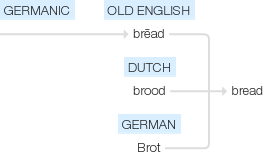Bread
Old English brēad, of Germanic origin; related to Dutch brood and German Brot .
wiktionary
From Middle English bred, breed, from Old English brēad(“fragment, bit, morsel, crumb", also "bread”), from Proto-Germanic *braudą(“cooked food, leavened bread”), from Proto-Indo-European *bʰerw-, *bʰrew-(“to boil, seethe”) (see brew). Alternatively, from Proto-Germanic *braudaz, *brauþaz(“broken piece, fragment”), from Proto-Indo-European *bʰera-(“to split, beat, hew, struggle”) (see brittle). Perhaps a conflation of the two.
Cognate with Scots breid(“bread”), Saterland Frisian Brad(“bread”), West Frisian brea(“bread”), Dutch brood(“bread”), German Brot(“bread”), Danish and Norwegian brød(“bread”), Swedish bröd(“bread”), Icelandic brauð(“bread”), Albanian brydh(“I make crumbly, friable, soft”), Latin frustum(“crumb”).
Eclipsed non-native Middle English payn(“bread”), borrowed from Old French pain(“bread”).
From Middle English brede(“breadth, width, extent”), from Old English brǣdu(“breadth, width, extent”), from Proto-Germanic *braidį̄(“breadth”). Cognate with Scots brede, breid(“breadth”), Dutch breedte(“breadth”), German Breite(“breadth”), Swedish bredd(“breadth”), Icelandic breidd(“breadth”).
From Middle English breden(“to spread”), from Old English brǣdan(“to make broad, extend, spread, stretch out; be extended, rise, grow”), from Proto-Germanic *braidijaną(“to make broad, broaden”).
Variant of braid, from Middle English breden, from Old English brēdan, breġdan(“to braid”).
etymonline
bread (n.)
"kind of food made from flour or the meal of some grain, kneaded into a dough, fermented, and baked," Old English bread "bit, crumb, morsel; bread," cognate with Old Norse brauð, Danish brød, Old Frisian brad, Middle Dutch brot, Dutch brood, German Brot. According to one theory [Watkins, etc.] from Proto-Germanic *brautham, from PIE root *bhreu- "to boil, bubble, effervesce, burn," in reference to the leavening.
But OED argues at some length for the basic sense being not "cooked food" but "piece of food," and the Old English word deriving from a Proto-Germanic *braudsmon- "fragments, bits" (cognate with Old High German brosma "crumb," Old English breotan "to break in pieces") and being related to the root of break (v.). It cites Slovenian kruh "bread," literally "a piece."
Either way, by c. 1200 it had replaced the usual Old English word for "bread," which was hlaf (see loaf (n.)).
Extended sense of "food, sustenance in general" (late 12c.) is perhaps via the Lord's Prayer. Slang meaning "money" dates from 1940s, but compare breadwinner, and bread as "one's livelihood" dates to 1719. Bread and circuses (1914) is from Latin, in reference to food and entertainment provided by the government to keep the populace content. "Duas tantum res anxius optat, Panem et circenses" [Juvenal, Sat. x.80].
bread (v.)
"to dress with bread crumbs," 1620s, from bread (n.). Related: Breaded; breading.
